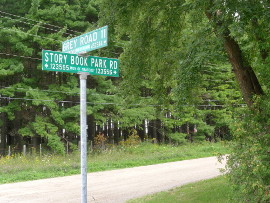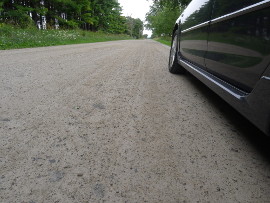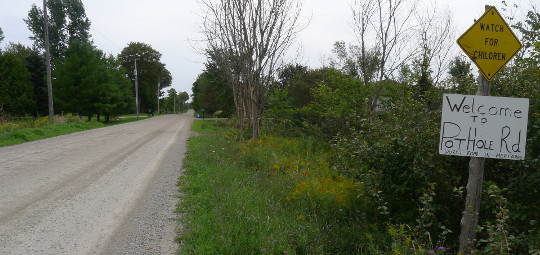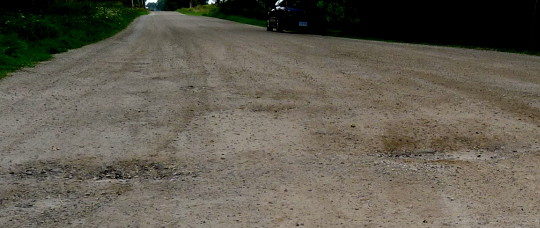Stephen Vance, Staff
On a quiet rural road in western Meaford, surrounded by bucolic farm fields, as your tires crunch along the gravel surface you’ll come across a sign that reads “Welcome to Pothole Road, Worst Road in Meaford”.
While many communities might challenge the ‘worst road in Meaford’ designation, for the residents of a 2.2 kilometre stretch of Story Book Park Road, east of Grey Road 11, who feel that their road is in terrible condition, life is no fairy tale.
Residents were given little notice, just a few days, before crews arrived last month to pulverize the tar and chip surface of their road before adding some additional gravel, reducing what had already been a horribly pothole-filled road into a dusty, gravel-surfaced mess according to residents of the road.

“There are 23 homes on this part of the road,” Story Book Park Road resident Hugh Greenwood told council. “And virtually every resident on the road have attended a meeting, or written their concerns about what has happened to our road. All are unhappy, and some would say upset, with what the municipality has done, and how Meaford went about it.”
Greenwood told council that residents of the road have been frustrated for years at what had been a poorly constructed road with a single layer of tar and chip on the surface. Potholes appeared frequently, and efforts by municipal road crews to fill those potholes with cold-patch did little to help. But residents say things got worse in July of this year.
“Ratepayers learned on July 12 in a note hand-delivered by two (municipal) employees to the 23 mailboxes on the road that pulverizing was to be carried out soon – an action completed three days later. At no time were we in any conversation or communication with the municipality about what was under consideration, what part of the road would be pulverized, the reasons for this, or if and when it was going to be done,” Greenwood told council.
While the plan to pulverize their road may have been a surprise to residents, the decision had been made at least two months prior. In a memo dated May 8, 2017, from Meaford Treasurer and Director of Infrastructure Management Darcy Chapman, council was advised of the plan to pulverize the more than two kilometres of Story Book Park Road east of Grey Road 11.
“Staff have been cold patching sections of Sideroad 23, Storybook Park Road and Euphrasia-St. Vincent Town Line for a while now with no progress. These sections were never constructed properly before being topped with surface treatment material which has contributed to the failing condition,” wrote Chapman in his May 8 memo. “Instead of allocating more man time and thousands of dollars towards cold patching, staff are of the opinion that grinding these sections of road would result in a more cost efficient way to maintain as a gravel surface. This would give the Municipality the flexibility needed until such time that a full reconstruct can be completed to adequately maintain these sections to the Minimum Maintenance Standards.”
Chapman noted in his memo that the decision would likely displease residents, but he argued that the municipality was wasting money by constantly filling potholes on the poorly constructed road.
“Reducing the road surface to gravel may not please the residents that want the road surface treated (or paved). On average the Municipality allocates $12,000-$14,000 yearly just on cold patch, and countless man-hours on these road sections. For around $5,000 we can grind the road and add some granular to the base resulting in a more efficient road condition,” said Chapman in his memo.

“As identified in the State of the Infrastructure for Municipal Roads (September 2014), one of the objectives of the ‘Preservation Model’ endorsed by Council was to “keep the good roads good”. The staff report identified that the ten-year plan was focused on resurfacing projects, rather than reconstruction projects, and that an unfortunate by-product of this objective was that bad roads would continue to get worse in this model,” Carbert told The Independent.
Pulverizing the road surface and adding gravel may have reduced the number and frequency of the road’s infamous potholes, but Greenwood said it has created other issues like dust in the air that have frustrated residents.
“Now we see the road pulverized and returned to a dusty washboard and pothole-infested road. The trucks used to provide garbage and recycling waste pickup now billow up clouds of dust, not to mention the school bus that comes by twice each day. Each of the 23 families is experiencing the same situation: substantially increasing property taxes, deteriorating services, an inferior road, and large vehicle repair costs resulting from poor road conditions, and poor repair work,” Greenwood told council.
Greenwood suggested that the roughly $25,000 that residents of the road claim to have spent on vehicle repairs due to the condition of the road amounts to an extra tax for those living there.
Making matters worse, Greenwood alleges that municipal staff have been disrespectful in their communications with residents of the road.
“The staff has been somewhat disrespectful. No, they’ve been very disrespectful of ratepayers reporting conditions on our road. This has been reported by several of our residents. In one case a property owner was asked ‘do you hear that?’. When the property owner said ‘no’, the staff member smirked and said ‘it’s the world’s smallest violin,” claimed Greenwood in his presentation to council. “That’s really not acceptable.”
Brian Davenport, another resident of Story Book Park Road noted in his remarks to council that his municipal tax bill arrived the day that crews were pulverizing the road in front of his home.
“This issue didn’t develop overnight, it has materialized over several years. It seems there’s been ample conflict between staff and ratepayers over the past few years reflecting a still unresolved situation where flaws in the road remain unresolved and the same potholes that previously existed are now reappearing,” Davenport told council.
Members of council were concerned about the frustration of residents, and they made it clear that they wanted to get to the bottom of the issue and resolve it.
“You have mentioned several things of deep concern to us,” Mayor Barb Clumpus told the residents at the conclusion of their presentation. Clumpus encouraged residents to use the municipality’s complaint process in order to have their alleged issues with municipal staff investigated.
As for the concerns residents have about their road, the mayor noted that the decision was made by the municipal administration based on financial considerations, and she and her fellow council members assured the residents that council would investigate the issue.
“This was a decision of the administration that was brought to our (council’s) attention on May 8. It wasn’t really a decision that council needed to make, it was an administrative decision based on the way the roads and transportation department is handling the maintenance of the roads,” noted Clumpus. “The best way to handle this is to send it back to staff to respond to all of your concerns. I know this is frustrating.”
Councillor Tony Bell appreciated the way the residents have handled their communications with members of council, and in their presentation.
“Thanks for you folks coming out. This is the way you do it. You come before council and you tell us in a very logical manner, which you have, and we very much appreciate that,” Bell told the residents seated in the council chamber gallery. “It’s to the point where maintenance over a long period of time because of a lack of funding, because of constraints of the day, the lack of money coming from the province and the feds, every municipality is hurting. We’re not immune to that financial problem.”
Bell assured the residents that council has been working to increase the annual funding for road maintenance and rehabilitation, and they remain committed to addressing the infrastructure needs of the municipality.
Councillor Steven Bartley agreed, and he also noted that a ‘band-aid’ solution is not enough.
“To just tar and chip it would be roughly $170,000, and we could do that tomorrow, and it would be inadequate. That would be good money after bad. To fix it, we’ve got to fix it,” suggested Bartley, noting the need for a full reconstruction of the road.
Council has asked staff to prepare a report responding to the concerns of the residents of Story Book Park Road, which will be presented at a future meeting.













